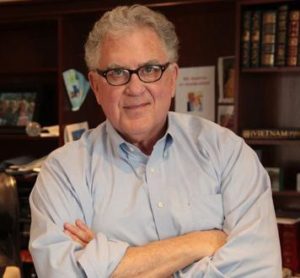As this issue of the Oklahoma Banker goes to press, the U.S. Senate is working through periodic floor statements relating to S. 2155. So far there are some 57 amendments that have been filed, and that does not include the Manager’s Amendment.
The way the Senate works, the first hurdle was to get past a filibuster (60 votes required). The Senate did that on a 67-32 bipartisan vote. Next up: A vote to proceed on the bill. When the Senate is formally debating the bill, or “on the bill” as they call it, no other pending business will be permitted.

As I noted above, senators have been making periodic statements for the record. Most of them read the statements just so they are accurately included in the record. The bill’s supporters and its opponents have been given a chance to speak. I watched as opponents took the floor and demagogued banks and bankers in general. It was very hard to watch without punching something or someone.
I’m as big a fan of political debate as there is. I’m “tweeting” up a storm during this exercise, thanking those who stand in favor of the bill [Sens. Heidi Heitkamp (D-N.D.), Jon Tester (D-Mont.), Mark Warner (D-Va.) and Joe Donnelly (D-Ind.) in particular] – and pointing out flaws in the arguments used specifically by Sens. Elizabeth Warren (D-Mass.), Bernie Sanders (I-Vt.) and Sherrod Brown (D-Ohio).
When it came time for some opponents to speak, I kept wondering, “who wrote the script” the opponents were using for their collective demagoguery. It certainly wasn’t written by anyone that’s read the bill or who’s interested in today’s reality of community banks and their customers.
Just as an example:
To be honest, as I listened to some of the statements by opponents, I wondered out loud: What the hell version of the bill are these people reading? Suffice it to say, my version was different.
Many of you know I was a big fan of Sen. Warren. I made a number of trips to Washington and visited directly with her and a few of her key staff members about the real world of community banks. I explained why the “one-size-fits-all” mentality has no place in the regulatory arena, for any industry, but especially for banking. I encouraged them to be more flexible, and to treat community banks differently.
I firmly believed she “got it.” I even wrote a letter to President Obama supporting her selection as the new CFPB director. I heard from a number of OBA-member banks about that letter, almost all of it strongly negative. My colleagues from around the country and the ABA said I was nuts, but I kept plodding ahead because I believed she would do what she said she was going to do. I should have listened to my colleagues.
On the day she was sworn in as the junior senator from Massachusetts, she gave me a hug and said, “Roger, you go tell those community bankers out there that I am their biggest champion.” I said, “Of course I will.” And I did. Rep. Jeb Hensarling (R-Texas) laughed in my face when I told him she had promised to help us.
The last meeting I had with her lasted for all of 8 minutes. It was scheduled for 15. As I flew back to Oklahoma, I looked at what few notes I had and replayed our discussion in my head, over and over again.
I recognized that something had happened. Something was different.
Something had changed.
That “something” is what has been on full display leading up to and during the floor debate on S. 2155.
The facts don’t seem to matter, as long as the underlying bill creates a forum in which she is able to lambast banks generally, and JPMorgan Chase, Bank of America, Citigroup and Wells Fargo, specifically.
In my opinion, what’s “changed” is the senator is much more mindful of her “progressive” supporters and how they view “bank reform” and Dodd-Frank. Moreover, all bankers are bad. It saddens me to realize that she’s just like most of the other “politicians” who’s had a taste of power and likes it. Promises to help community banks get some relief so they can better serve their customers? That was then, this is now, and – oops – yes, I’m up for reelection this year.
The OBA and my colleagues across the country, the ICBA and the ABA represent banks – including traditional community banks – with one purpose in mind: to help them help their customers and their communities. How do they do that? By making more credit available to them and reducing the risk of doing so to the fullest possible extent.
That’s what this bill is all about, in spite of anti-bank claims to the contrary. I hope by the time you read this column S. 2155 has passed the Senate with about 70 “aye” votes.
 Oklahoma Bankers Association We make bankers better!
Oklahoma Bankers Association We make bankers better!
